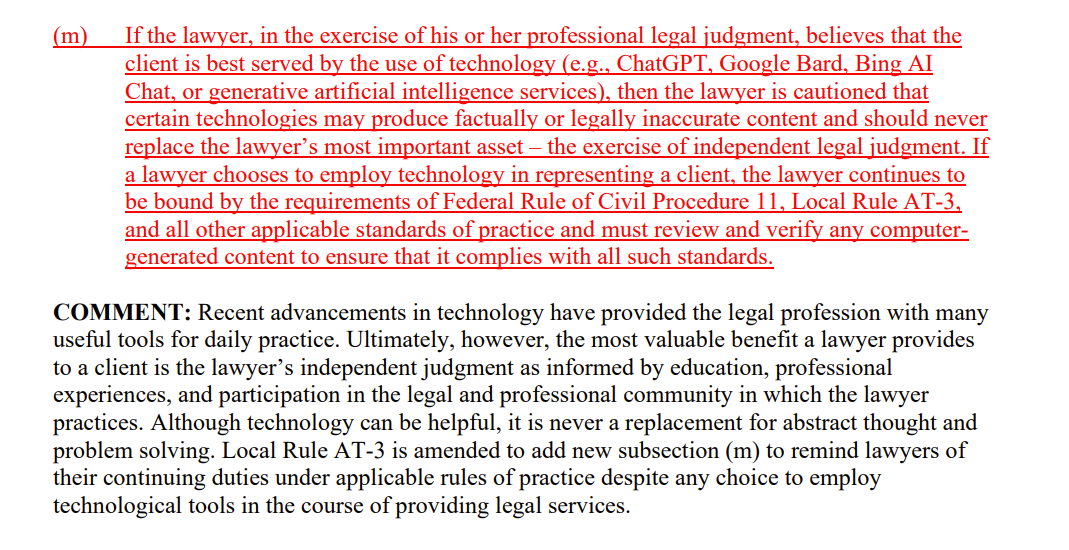An antitrust case in Tennessee recently produced a remarkably contentious dispute about the definition of “double spacing,” as deftly summarized in this “Above the Law” article titled “Heated Litigation Fight Over Double Spacing Ends in Judge Telling Everyone to Shut Up.” While the dispute was picayune, the discussion of just what exactly “double spacing” means is interesting background for a modern word-processing feature that we seldom stop and think about. Thanks to my law partner Chris Schwegmann for flagging this for me.
Monthly Archives: November 2023
 A series of cases about the EPA’s regulation of small refineries led to a disagreement about Circuit venue over this kind of administrative-agency challenge. A majority appled a two-part test focused on whether the agency action was “nationally applicable”; the dissent rejected the majority’s analysis as inconsistent with statutory text, purpose, and structure. No. 22-60266 etc. (Nov. 22, 2023).
A series of cases about the EPA’s regulation of small refineries led to a disagreement about Circuit venue over this kind of administrative-agency challenge. A majority appled a two-part test focused on whether the agency action was “nationally applicable”; the dissent rejected the majority’s analysis as inconsistent with statutory text, purpose, and structure. No. 22-60266 etc. (Nov. 22, 2023).
 The “Lyme Wars” are an ongoing medical controversy about the diagnosis and treatment of Lyme disease. Absent Supreme Court review, one front in those “wars” ended in Torrey v. Infectious Diseases Society of America, in which the Fifth Circuit affirmed the dismissal of defamation claims related to statements in a medical journal: “[T[he district court did not err in holding that IDSA’s Guidelines statements about chronic Lyme disease constitute nonactionable medical opinions.” No. 22-40728 (Nov. 16, 2023).
The “Lyme Wars” are an ongoing medical controversy about the diagnosis and treatment of Lyme disease. Absent Supreme Court review, one front in those “wars” ended in Torrey v. Infectious Diseases Society of America, in which the Fifth Circuit affirmed the dismissal of defamation claims related to statements in a medical journal: “[T[he district court did not err in holding that IDSA’s Guidelines statements about chronic Lyme disease constitute nonactionable medical opinions.” No. 22-40728 (Nov. 16, 2023).
 The latest installment in the “Bar Wars” litigation about speech by compulsory bar associations is Boudreaux v. Louisiana State Bar Ass’n, holding:
The latest installment in the “Bar Wars” litigation about speech by compulsory bar associations is Boudreaux v. Louisiana State Bar Ass’n, holding:
[T]he majority of speech Boudreaux objects to is germane. Speech can be germane even if it is “controversial and ideological.” But the LSBA crossed the line when it promoted purely informational articles absent any tailoring to the legal profession. That includes the LSBA’s tweet about student-loan reform and its promotion of the History.com article through a pride flag icon. Advancing generic political and social messages in those ways violates the First Amendment rights of the LSBA’s dissenting members.
No. 22-30564 (Nov. 13, 2023).
 The question in Elmen Holdings, LLC v. Martin Marietta Mat’ls, Inc. was whether a gravell-mining lease had terminated. The district court included that it had been terminated, and the appellant’s first issue was that the court’s analysis went too far under the “party-presentation” principle — a concept given new life and relevance by United States v. Sineneng-Smith, 140 S. Ct. 1575 (2020).
The question in Elmen Holdings, LLC v. Martin Marietta Mat’ls, Inc. was whether a gravell-mining lease had terminated. The district court included that it had been terminated, and the appellant’s first issue was that the court’s analysis went too far under the “party-presentation” principle — a concept given new life and relevance by United States v. Sineneng-Smith, 140 S. Ct. 1575 (2020).
 The Fifth Circuit concluded that while the appellant’s argument “had some merit,” the trial court did not go too far:
The Fifth Circuit concluded that while the appellant’s argument “had some merit,” the trial court did not go too far:
“[T]he magistrate judge recommended granting Elmen’s motion for summary judgment because Martin Marietta had been late on several royalty payments. The magistrate judge did not ‘radical[ly] transform[]’ this case to such an extent as to constitute an abuse of discretion; she merely took a different route than Martin Marietta and Elmen had suggested to ;decide . . . questions presented by the parties.’ Therefore, the magistrate judge did not violate the party presentation principle by interpreting the Gravel Lease to terminate automatically upon a missed royalty payment, even if that interpretation was contrary to the parties’ reading of their contract.”
No. 23-20023 (Nov. 15, 2023); cf. United Natural Foods v. NLRB, 66 F.4th 536 (5th Cir. 2023) (majority and dissent disagree about whether a particular line of argument is allowed by the party-presentation principle).
 Anytime Fitness LLC v. Thornhill Bros. Fitness LLC, acknowledging that a bankruptcy debtor may assign or assume an executory contract, provided an important reminder about the extent of that power: “We reiterate our prior holdings: a debtor assuming an executory contract cannot separate the wheat from the chaff. And we make clear that, when a trustee relies on § 365(f) to assign an executory contract in bankruptcy, it must assign the contract in whole, not in part.” No. 22-30757 (Oct. 27, 2023).
Anytime Fitness LLC v. Thornhill Bros. Fitness LLC, acknowledging that a bankruptcy debtor may assign or assume an executory contract, provided an important reminder about the extent of that power: “We reiterate our prior holdings: a debtor assuming an executory contract cannot separate the wheat from the chaff. And we make clear that, when a trustee relies on § 365(f) to assign an executory contract in bankruptcy, it must assign the contract in whole, not in part.” No. 22-30757 (Oct. 27, 2023).
 The Oil Pollution Act provides remedies for the wrongful release of oil into the environment. CERCLA does the same for a number of other pollutants. The issue in Munoz v. Intercontinental Terminals Co., LLC was whether OPA liability extended to a spill that combined oil with other hazardous substances regulated by CERCLA. Based on statutory language and structure, the Fifth Circuit concluded that the OPA did not apply to such a chemical release. No. 22-20456 (Oct. 27, 2023).
The Oil Pollution Act provides remedies for the wrongful release of oil into the environment. CERCLA does the same for a number of other pollutants. The issue in Munoz v. Intercontinental Terminals Co., LLC was whether OPA liability extended to a spill that combined oil with other hazardous substances regulated by CERCLA. Based on statutory language and structure, the Fifth Circuit concluded that the OPA did not apply to such a chemical release. No. 22-20456 (Oct. 27, 2023).
 In an instructive review of a products-liability judgment based on expert testimony and a hotly disputed jury instruction, the Fifth Circuit affirmed in Kim v. American Honda Motor Co.:
In an instructive review of a products-liability judgment based on expert testimony and a hotly disputed jury instruction, the Fifth Circuit affirmed in Kim v. American Honda Motor Co.:
Honda attempts to escape this jury verdict by arguing the district court erred in three ways: by admitting Plaintiffs’ experts, denying its JMOL motion, and denying its proposed instruction about the nonliability presumption. But it is incorrect on all fronts. The Plaintiffs’ experts based their opinions on reliable methodologies and provided relevant, helpful testimony. As such, there was sufficient evidence for the jury to find Honda liable for the Kims’ injuries. The district court’s application of the Texas statutory presumption of nonliability was also faithful to the statutory text, the precedent of Texas, and the precedent of this Court.
No. 22-40790 (Nov. 7, 2023).
 Antero Resoiures Corp. v. C&R Downhole Drilling Inc., an appeal about an $11 million judgment for alleged overbilling in energy production, rejected a second challenge to the plaintiff’s damages calculation in addition to the one discussed yesterday.
Antero Resoiures Corp. v. C&R Downhole Drilling Inc., an appeal about an $11 million judgment for alleged overbilling in energy production, rejected a second challenge to the plaintiff’s damages calculation in addition to the one discussed yesterday.
Specifically, the appellant argued that the expert’s testimony “was deficient because it did not consider what rates competing drillout providers might have paid. Even if the Robertson companies took longer, so the argument goes, if they charged significantly less than other companies, Antero might have ended up paying less than if it had hired someone else.”
The Fifth Circuit rejected this argument for two related resons:
- Legal materiality. “[E]vidence of a competitor’s rate is not necessary to prove out-of pocket damages. To show damages, Antero need only prove that the Robertson companies charged it more than the ‘value [Antero] received.’ By billing Antero more than the services it rendered, Kawcak caused Antero to incur out-ofpocket expenses. That is, Antero paid $150,000,000 in exchange for a certain number of days of work. But because the Robertson companies did not actually work on all of the days they billed, the value of the work Antero received was only $138,877,860. The difference in value is the amount overbilled. No reference to competitors’ rates is needed for that statement to be true.”
- Factual materialty. “[T]he jury was not required to accept Kawcak’s testimony regarding Fortis Energy’s rates. As Antero points out, there are multiple reasons why the jury might not have credited Kawcak’s assertion that Fortis Energy was the only other available drillout provider, and that it would have charged more than the Robertson companies. Kawcak gave the rates strictly from memory, and his credibility was already in question because of his inconsistent answers to previous questions.”
No. 22-10918 (Oct. 31, 2023) (citations omitted).
 Antero Resoiures Corp. v. C&R Downhole Drilling Inc. presented a dispue about the calculation of damages in a case about alleged overbilling in energy production. The Fifth Circuit affirmed against a challenge that the plainitff’s expert was not sufficiently precise, holding:
Antero Resoiures Corp. v. C&R Downhole Drilling Inc. presented a dispue about the calculation of damages in a case about alleged overbilling in energy production. The Fifth Circuit affirmed against a challenge that the plainitff’s expert was not sufficiently precise, holding:
[T]the amount of damages need only be proven “with a reasonable degree of certainty.” Taylor’s testimony calculated Antero’s out-of-pocket damages to a reasonable degree of certainty, especially when viewing the evidence in favor of the verdict. Taylor followed sound analytical methods to determine how long the Robertson companies should have taken to complete the drillout services. He reviewed the hundreds of completion reports and tens of thousands of invoices, accounting for uncontrollable delays and site-specific conditions. Taylor then compared the time spent to the time taken by previous drillout providers and concluded that the Robertson companies took some percentage longer than those companies. Applied to the rates charged by the Robertson companies, Taylor calculated damages in the amount of $11,122,140. That is a perfectly rational way of approximating overbilling.
No. 22-10918 (Oct. 31, 2023) (citation omitted).
 In Chamber of Commerce v. U.S. Sec. & Exch. Comm’n, the Fifth Circuit found that the SEC acted too quickly in enacting a challenged rule, but then allowed it a “do-over” within a specified time:
In Chamber of Commerce v. U.S. Sec. & Exch. Comm’n, the Fifth Circuit found that the SEC acted too quickly in enacting a challenged rule, but then allowed it a “do-over” within a specified time:
The SEC acted arbitrarily and capriciously, in violation of the APA, when it failed to respond to petitioners’ comments and failed to conduct a proper cost-benefit analysis. We recognize that “there is at least a serious possibility that the agency will be able to substantiate its decision given an opportunity to do so.” Short of vacating the rule, we therefore afford the agency limited time to remedy the deficiencies in the rule. Because, for the reasons explained, the SEC’s adoption of the Share Repurchase Disclosure Modernization Rule is arbitrary and capricious, the petition for review is GRANTED, and this matter is REMANDED with direction to the SEC to correct the defects in the rule within 30 days of this opinion. This is a limited remand. This panel retains jurisdiction to consider the decision that is made on remand.
No. 23-60255 (Oct. 31, 2023); but cf. Alliance for Hippocratic Medicine v. U.S. Food & Drug Admin., No. 23-10362 (Aug. 16, 2023).
 In re TikTok, Inc. returns to the ground plowed by In re Volkswagen in 2008 and In re Radmax in 2014: a mandamus petition about the erroneous denial of a motion to transfer venue under 28 USC § 1404(a). In this case (an intellectual-property case brought against TikTok by another Chinese business), The Fifth Circuit noted several missteps by the district court that justified mandamus relief, inter alia:
In re TikTok, Inc. returns to the ground plowed by In re Volkswagen in 2008 and In re Radmax in 2014: a mandamus petition about the erroneous denial of a motion to transfer venue under 28 USC § 1404(a). In this case (an intellectual-property case brought against TikTok by another Chinese business), The Fifth Circuit noted several missteps by the district court that justified mandamus relief, inter alia:
- Relative ease of access to sources of proof–source code. “The district court concluded that the source code was accessible as easily in Texas as in California because one member of the California engineering team with the needed security clearance worked remotely in Irving, Texas. But the court erred by comparing Texas with California when it should have been comparing the Western District of Texas with the Northern District of California.”
- Relative ease of access to sources of proof–people. “Neither the district court nor Meishe identifies any record evidence showing that any employee in the Western District of Texas possesses proof relevant to this case. The district court relied on deposition testimony and witness declarations from several of petitioners’ employees. That evidence, however, only establishes that a high-ranking company executive and other employees worked in Austin as members of a “Global Business Solutions Group.” It does not tie those individuals to this case, or show that they do any work related to the video-editing functionality or its implementation, or support the proposition that any of them would have physical proof relevant to the adjudication of Meishe’s claims. … [I]t is pure speculation whether any of petitioners’ Austin-based employees possesses or has access to proof relevant to this case.”
- Court-created delay. “Petitioners filed their § 1404(a) motion timely, yet the district court took no action on the motion for months, with the record showing no adequate reason for the delay. Moreover, the court failed to grant a stay, so the case proceeded through discovery for almost a year. When the court finally ruled, it used the case progress its delay engendered as a reason for denying transfer. If we were to hold that this is a proper exercise of discretion, a district court would have absolute control over whether these two factors weighed in favor of transfer.”
Joining other courts that have made similar additions to their local rules, the Eastern District of Texas now has new local rules dealing with the use of generative AI:
 Anytime Fitness LLC v. Thornhill Bros. Fitness LLC, an opinion about a bankruptcy debtor’s power to partially assign a contract, quotes the useful but infrequently heard principle of “Nemo dat quod non habet” (“No one can give what they do not have.”). The principle is quoted in a suprising variety of situations and has inspired academic commentary about its interplay with related ideas.
Anytime Fitness LLC v. Thornhill Bros. Fitness LLC, an opinion about a bankruptcy debtor’s power to partially assign a contract, quotes the useful but infrequently heard principle of “Nemo dat quod non habet” (“No one can give what they do not have.”). The principle is quoted in a suprising variety of situations and has inspired academic commentary about its interplay with related ideas.
